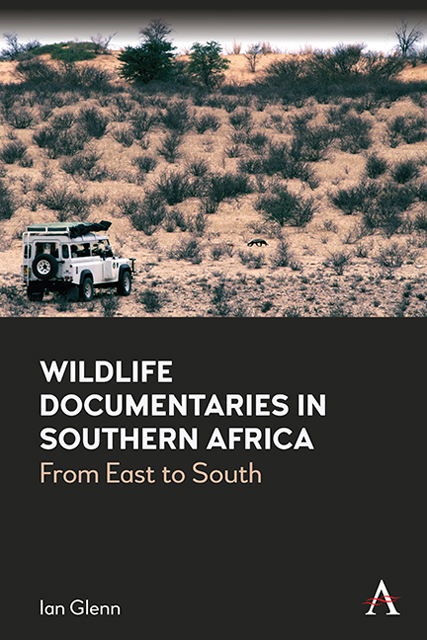Book contents
- Frontmatter
- Dedication
- Contents
- List of Figures
- Acknowledgements
- Introduction
- Chapter 1 What do the Critics Say?
- Chapter 2 A Theoretical Coalition?
- Chapter 3 Gone South: From East to Southern Africa
- Chapter 4 Private Lodges, Infrastructures and Guides
- Chapter 5 Going South: The Results
- Chapter 6 The Early History
- Chapter 7 The South Africans Enter the Game
- Chapter 8 Michael Rosenberg and Partridge Films
- Chapter 9 David and Carol Hughes
- Chapter 10 The Bartletts in the Namib, the Liversedges in Botswana
- Chapter 11 John Varty, Elmon Mhlongo and Londolozi
- Chapter 12 Richard Goss and Kim Wolhuter
- Chapter 13 Dereck and Beverly Joubert
- Chapter 14 Other Major Contributors
- Chapter 15 Going Live: Africam And Wildearth
- Chapter 16 Craig and Damon Foster
- Chapter 17 Must Love Animals?
- Chapter 18 The Social Turn
- Chapter 19 The Future of the Genre
- Chapter 20 The Influence of the Genre
- Conclusion
- Filmography
- Plates
- References
- Index
Chapter 11 - John Varty, Elmon Mhlongo and Londolozi
Published online by Cambridge University Press: 10 January 2023
- Frontmatter
- Dedication
- Contents
- List of Figures
- Acknowledgements
- Introduction
- Chapter 1 What do the Critics Say?
- Chapter 2 A Theoretical Coalition?
- Chapter 3 Gone South: From East to Southern Africa
- Chapter 4 Private Lodges, Infrastructures and Guides
- Chapter 5 Going South: The Results
- Chapter 6 The Early History
- Chapter 7 The South Africans Enter the Game
- Chapter 8 Michael Rosenberg and Partridge Films
- Chapter 9 David and Carol Hughes
- Chapter 10 The Bartletts in the Namib, the Liversedges in Botswana
- Chapter 11 John Varty, Elmon Mhlongo and Londolozi
- Chapter 12 Richard Goss and Kim Wolhuter
- Chapter 13 Dereck and Beverly Joubert
- Chapter 14 Other Major Contributors
- Chapter 15 Going Live: Africam And Wildearth
- Chapter 16 Craig and Damon Foster
- Chapter 17 Must Love Animals?
- Chapter 18 The Social Turn
- Chapter 19 The Future of the Genre
- Chapter 20 The Influence of the Genre
- Conclusion
- Filmography
- Plates
- References
- Index
Summary
Introduction
John Varty did not come to wildlife filmmaking through any of the conventional routes. After the untimely death of his father meant that he had to give up plans to become a professional cricket player in England, he and his brother David persuaded their mother to let them take over the family hunting farm Sparta and turn it into a tourist destination. Both brothers have written important accounts of the development of Sparta into Londolozi (Varty 2008, 2014). Varty then became involved in wildlife filmmaking as a result of helping write scripts for Rick Lomba’s films that looked at the problems of excessive land use by commercial cattle farming and of new game fences. Varty was given a film camera as some kind of recompense when Lomba could not pay him and so ended up with the means to record animal behaviour.
Guides and Londolozi
The earliest Londolozi films showed Varty using his camera to record knowledgeable guides at Londolozi. The first, Focus on Africa (1983), starred Ian Thomas as photographer and him and his tracker Phineas Mhlongo as knowers of the bush. A fair amount of this film amounts to what one could see as advice to people thinking of going on a photographic safari: Thomas suggests what lenses would be optimal for use in (stills) photography and the film then shows him in action, for example intrepidly in a river with camera, trying to film hippos or animals drinking.
But the film had another motive besides giving photographic advice and the origin of the film lay for Varty in his sense that he should try to portray bush lore or what made for successful guides. Ian Thomas recalls:
One day I was sitting with John and some distance away, I heard some birds giving alarm calls at a snake. I mentioned this to him, and pointed towards a tree and said, ‘There is a snake over there’. He looked at me a bit sceptically, so we walked to the bush and sure enough a Black Mamba moved away in front of us. Straight away, he said that he would like to make a film about Phineas and me tracking together. What also spurred it on was that Phineas and I had a reputation for being able to track and find animals, particularly Lion and Leopard.
- Type
- Chapter
- Information
- Wildlife Documentaries in Southern AfricaFrom East to South, pp. 147 - 160Publisher: Anthem PressPrint publication year: 2022

